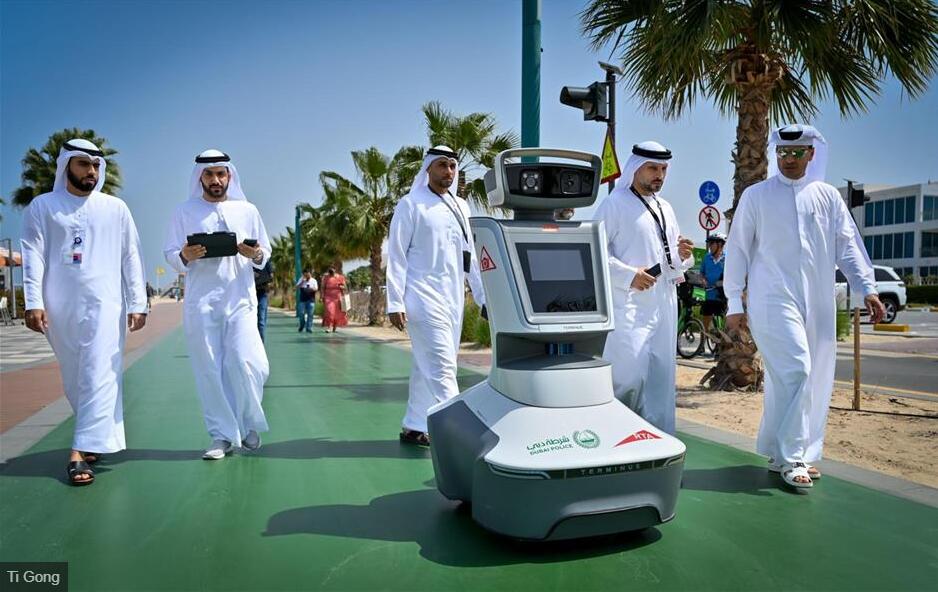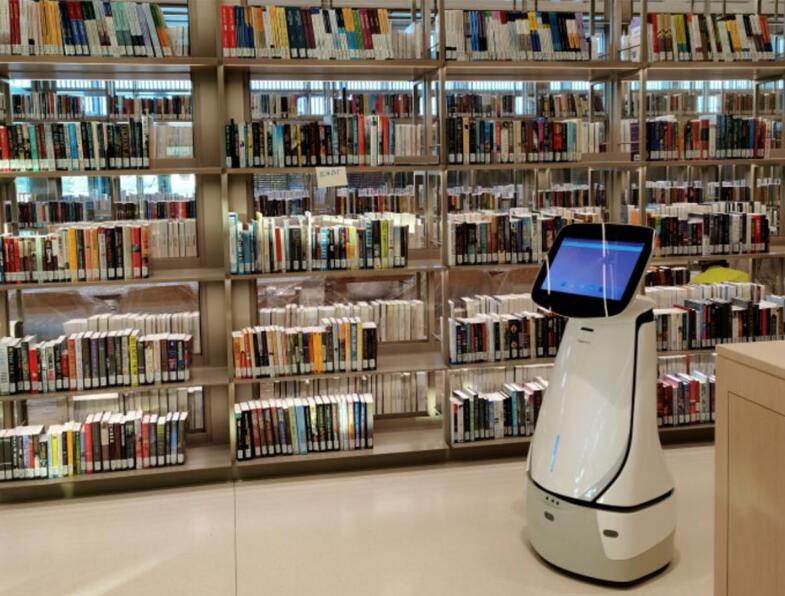Chinese Robots Transform Dubai

A robot patrols Jumeirah Beach in Dubai.
Chinese-made intelligent robots, ranging from delivery persons to patrol officers and service professionals, are now popping up in Dubai. Terminus, a Chinese technology company, is driving this technological revolution.
Terminus has formed a partnership with the Dubai Roads and Transport Authority (RTA) to introduce AI-powered robots that identify traffic offenses with an accuracy rate of over 85 percent. Robots have been patrolling Jumeirah Beach since March. They provide real-time infraction data within five seconds and monitor a two-kilometer region. They also collect statistics on green modes of transportation such as bicycles and electric scooters, which helps Dubai promote sustainable transportation.
This partnership is not new. Terminus and Dubai's collaboration dates back to Expo 2020 Dubai, where the company deployed over 150 intelligent robots to greet and interact with visitors, provide information, and even deliver meals in collaboration with Talabat, a popular Middle Eastern food delivery app.

Children pose with Opti, one of the robot mascots at Expo 2020 Dubai that is developed by Terminus.
Terminus' international business has increased significantly since Expo 2020, with the event allowing the company to develop its projects and business activities in the UAE, Saudi Arabia, Qatar, Oman, and other countries in the region.
The company has struck a comprehensive strategic partnership with Injazat, the Middle East's leading smart technology enterprise, to collaborate on underlying technology, mid-tier solutions, and upper-level smart city planning. This collaboration intends to speed up the digitalization and smart transformation of cities in the UAE and abroad.
Terminus has also finished the smart renovation project for Sharjah's "House of Wisdom," dubbed the world's most advanced digital library. Visitors to the House of Wisdom will encounter Terminus' "robot librarians," who offer a variety of services, including assisting visitors in managing the library's inventory.
Terminus set up its Middle East and North Africa (MENA) headquarters in Dubai in September 2021, thereby bolstering its global strategic layout. In February 2024, the company established its international headquarters in Dubai, marking a key step in its expansion into foreign markets.

A robot in Sharjah's "House of Wisdom.
Victor Ai , Terminus' founder and CEO, feels the Middle East's digital economy has enormous potential for growth. Terminus' goal in advancing the joint construction of the Digital Silk Road between China and Middle Eastern countries is to share digital economic opportunities and optimize the rewards of such collaborative efforts.
"In 2024, marking the 40th anniversary of China-UAE diplomatic relations, Terminus aims to further integrate China and UAE's digital and intelligent industries, contributing to the Gulf region's digital economy and rejuvenating ancient civilizations in the digital and intelligent era," Ai said.
Dubai, the Middle East's economic and tourism powerhouse, is attracting major Chinese investment in green technology, electric vehicles, e-commerce, artificial intelligence, healthcare, and renewable energy. According to Dubai FDI Monitor, Chinese investments in Dubai totaled US$5.4 billion between 2015 and 2023, and over 5,400 Chinese businesses are active Dubai Chamber of Commerce members by mid-2024.
Chinese companies are not only capitalizing on digital economic prospects, but also forming long-term alliances with local leaders to develop comprehensive digital business platforms. This strategic collaboration sets the path for more participation in the region's smart upgrade programs, while also highlighting China's transformation from the "world's factory" to a "technology powerhouse."
Beyond Terminus, other Chinese tech behemoths such as Meituan, Alibaba, ByteDance, and JD.com are expanding their Middle Eastern footprint, indicating a strong commitment to the region's digital future.
The Middle East stands out as an important hub for digital economy growth, as it is currently undergoing a significant digital transition. McKinsey predicts that by 2025, the region's unified digital market will have 160 million potential users, producing up to 3.8 percent of GDP annually , or US$95 billion.
As digital transformation revolutionizes global economies and governance structures, China and its "Belt and Road" partners are embracing the change.
The GCC (Gulf Cooperation Council) countries, particularly the UAE, Bahrain, and Saudi Arabia, are leading the way with favorable policies. The UAE, for example, announced a digital economy strategy in 2022 with the goal of increasing its digital GDP contribution from 9.7 percent to 19.4 percent over the next ten years.
With Terminus and other Chinese tech businesses leading the way, the Middle East's digital economy is expected to grow rapidly, from US$180 billion in 2022 to US$780 billion by 2030, at a compound annual growth rate of 20 percent. According to a UBS Group AG analysis, this places the region among the world's fastest-growing digital economy.
Source: SHINE Editor: Li Qian
